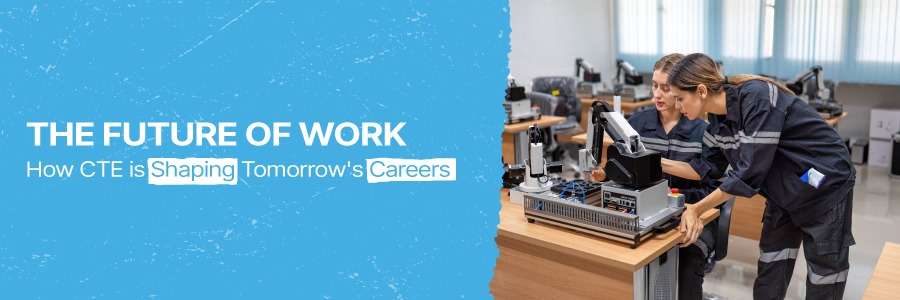
By: Creonow
The Future of Work: How CTE is Shaping Tomorrow's Careers
Imagine a classroom where students are not only learning from their textbooks but are actively involved in building robots, simulating surgical procedures, and solving other real-world problems. These are not scenes from a futuristic movie; this is the reality of Career and Technical Education (CTE) programs today.
As the world of work evolves at lightning speed, CTE is stepping up to provide students with the tools and skills they need to succeed in the careers of tomorrow. This read will explore how CTE is revolutionizing education and shaping the future workforce.
The Evolution of CTE: Beyond Vocational Training
When you hear vocational training, you might think of outdated workshops teaching basic trade skills. However, CTE programs have transformed into something far more dynamic and comprehensive. They now encompass a wide range of fields from healthcare and information technology to agriculture and advanced manufacturing.
Historically, vocational education was often viewed as a secondary option for students not pursuing traditional college degrees. Today, CTE has become a primary pathway that equips students with the skills and knowledge needed for high-demand careers.
Bridging the Skills Gap
Imagine a company ready to expand but unable to find enough qualified workers to fill the positions. This scenario is all too common across various industries today. A significant skills gap exists between what employers need and what job seekers possess.
CTE programs are stepping up to bridge this gap. Educational institutions are aligning their curriculums with current industry standards through partnerships with businesses. This means students are learning theoretical concepts and gaining hands-on experience with the tools and technologies they will encounter in the workplace. Consequently, they graduate ready to take on essential roles in their chosen fields.
Real World Learning
CTE programs allow students to intern at tech companies where they can work alongside industry professionals on real-time projects. This kind of experience is invaluable, providing insights and skills that can't be learned from a textbook alone.
Real-world learning not only prepares students for specific jobs but also helps them develop critical soft skills like communication, teamwork, and problem-solving. Employers consistently rank these skills as top priorities when hiring. As a result, many CTE graduates find themselves more prepared for the workforce than their peers who pursue traditional academic routes.
Promoting Diversity and Inclusion
CTE programs play a major role in promoting diversity and inclusion in the workforce. By providing opportunities for students from various backgrounds, these programs break down barriers and create pathways to success for everyone.
Consider a young woman interested in engineering—a field traditionally dominated by men. Through a CTE program, she gains access to mentors, resources, and hands-on experiences that inspire her to pursue her passion. CTE allows individuals from all walks of life to explore and excel in fields they might not have previously considered.
Adapting to Technological Advancements
As technologies develop at an unprecedented pace, the workforce must adapt accordingly. CTE programs are at the forefront of this adaptation, continuously updating their offerings to reflect the latest industry trends and technological innovations.
For instance, as artificial intelligence and automation reshape industries, CTE programs integrate these technologies into their curricula. This ensures students are well-versed in the tools they will use in their careers.
Higher Education and Lifelong Learning
CTE provides avenues for higher education and lifelong learning. Many CTE programs offer pathways to certifications, associate degrees, and even bachelor's degrees. This flexibility allows students to customize their educational journeys based on their goals and aspirations.
This approach provides a clear and attainable pathway to success, accommodating different learning styles and career objectives.
Government Support and Investment
Recognizing the importance of CTE, governments at all levels are investing in these programs. This support includes funding for modern facilities, updated equipment, and educator professional development. Such investments demonstrate a commitment to creating a skilled, competitive workforce that can drive economic growth and innovation.
Looking Ahead
As we look to the future, it is clear that CTE will continue to play an important role in preparing students for successful careers. By providing real-world learning experiences and promoting diversity and inclusion, CTE is shaping tomorrow's workforce leaders.
With a broad range of programs and opportunities, CTE offers something for everyone. The future of work is here, and with CTE leading the way, it's full of exciting possibilities.